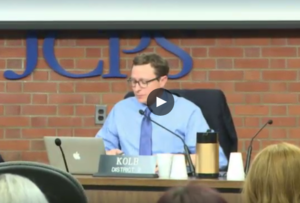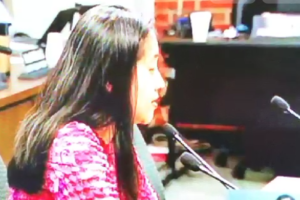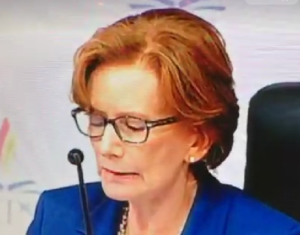
Chris Kolb speaks on the detrimental impacts of HB151 (16:00 mark).
Remarks on HB151
Dr. Chris Kolb
JCPS Board of Education Special Called Meeting
Wednesday, March 1, 2017
I’d like to share an email I got from one of my constituents this morning.
One of the reasons my family returned to Louisville to raise our children is JCPS’s vibrant system of magnet programs. My daughter’s middle school will prepare her for wherever she wants to go next—she’ll have the academic preparation if she wants to focus on language at Atherton’s IB program, she’ll have arts experience if she wants to pursue art at YPAS or Manual; if she’s interested in learning more about law and politics, Seneca, with its legal work magnet, is her resides school. What a great selection we have! Thanks to JCPS our city is full of people who want to venture into new-to-us areas. My children go to school with kids who have similar life experiences and kids who don’t. Thanks to JCPS families have been allowed to choose the educational approaches that will best help them succeed. Please don’t allow Frankfort’s legislators limit my kids’ friendships to those we already have met. Don’t send us back to our isolated islands, segregated again.
Thirty-eight days before I was born, white pro-segregation rioters in Louisville burned school buses, threw rocks, and attacked police. The Ku Klux Klan organized and led several such riots in Louisville, all in the name of “neighborhood schools.” Many in the all-white crowds held Confederate flags while they threatened, harassed, and assaulted black children.
But our city persisted, led by the courage of African American parents and children. And thanks to their sacrifices, I was able to attend high-quality, integrated public schools in Louisville, as have my children. Thanks to their bravery, I have lifelong friendships with people from all over the city I never would have met. I am extremely grateful for their sacrifice and struggle.
But now we are facing the very real possibility that the hard-won progress of the last 42 years will be undone through government overreach into local affairs by state legislators, the overwhelming majority of whom do not live in our community.
House Bill 151 threatens a core principle of our democracy: local control of our school system. It’s curious that many of the lawmakers who just spent eight years consistently complaining about what they perceived to be federal overreach of the Obama Administration are now some of the most vocal supporters of state overreach into local issues.
The voters of Jefferson County elected the seven of us you see before you. I would ask our state legislators to remember that seven of the fourteen candidates for the JCPS Board of Education in 2012 ran on a platform of “neighborhood schools.” They were all defeated, most of them handily. The voters and families of Jefferson County have spoken on this issue time and time again and the state should respect the democratic will of Jefferson County voters. It is simply not acceptable for state legislators with little or no experience in Jefferson County to undermine the democratic will of Jefferson County voters in dictating where our kids can and can’t go to school.
In addition, there are several reasons why HB151 will have significant negative impacts on our families. It will lead to less choice, less predictability, less equity, and wider achievement gaps. These are not debatable points. This is what data, evidence, and logic tell us will happen.
But on top of all that, HB151 will not even accomplish what it sets out to do. For instance, if HB151 is implemented, the closest school with guaranteed openings for some students who currently attend Shawnee will be Waggener. Instead of a 1.9 mile walk or a 19-minute bus ride to Shawnee to participate in after-school activities, these students will endure an hour and a half ride on two different TARC buses to do so. While Waggener is over eight times farther away than Shawnee, Waggener will be the closest “neighborhood school” for many kids.
Families who live as little as 0.8 miles away from King Elementary will not be guaranteed admittance, nor will families living 0.73 miles from the Academy at Shawnee, 0.9 miles from Frayser, 0.84 miles from Rutherford, or 2.6 miles from Carrithers. And these boundaries will change every… single… year. The only way to guarantee you will get into your neighborhood school is to move, literally, across the street from it. On top of the dozens of other reasons HB151 is unwise, HB151 is not even a neighborhood schools bill.
In closing, I want to share something from an article in the Atlantic magazine in 2015 comparing Louisville to Detroit. In 1974, Detroit largely abandoned school desegregation efforts.
By 2000, … the average black Detroit student went to school with less than two percent white students, while in Louisville, the average black student went to a school that was half white. In 2011, 62 percent of Louisville fourth-grade students scored at or above basic levels for math; only 31 percent of Detroit students did.
As researcher Gary Orfield states,
Go to Louisville, go to Detroit they’re just different planets today. … These are places that had the same percentage of black people, they had the same percentage of poor people, they were almost identical, racially and socially. And Louisville is thriving. And Detroit’s collapsed.
HB151 is a threat to local democracy, to school choice, to student achievement, to a more integrated community, and to the economic livelihood and the very future of our city itself. Decisions with this level of impact on our community must be left to the people who actually live here, pay taxes here, and who vote for School Board here.
Thank you.
 Dear JCPS,
Dear JCPS,



